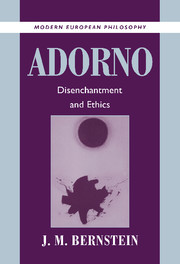Book contents
- Frontmatter
- Contents
- Preface
- List of Abbreviations
- Introduction
- 1 “Wrong Life Cannot Be Lived Rightly”
- 2 Disenchantment: The Skepticism of Enlightened Reason
- 3 The Instrumentality of Moral Reason
- 4 Mastered by Nature: Abstraction, Independence, and the Simple Concept
- 5 Interlude: Three Versions of Modernity
- 6 Disenchanting Identity: The Complex Concept
- 7 Toward an Ethic of Nonidentity
- 8 “After Auschwitz”
- 9 Ethical Modernism
- Index
3 - The Instrumentality of Moral Reason
Published online by Cambridge University Press: 05 June 2012
- Frontmatter
- Contents
- Preface
- List of Abbreviations
- Introduction
- 1 “Wrong Life Cannot Be Lived Rightly”
- 2 Disenchantment: The Skepticism of Enlightened Reason
- 3 The Instrumentality of Moral Reason
- 4 Mastered by Nature: Abstraction, Independence, and the Simple Concept
- 5 Interlude: Three Versions of Modernity
- 6 Disenchanting Identity: The Complex Concept
- 7 Toward an Ethic of Nonidentity
- 8 “After Auschwitz”
- 9 Ethical Modernism
- Index
Summary
In this chapter I want to offer a contextualized reading and genealogical reconstruction of Kant's moral thought in order that it can be understood as both a response to the problem of disenchantment and a continuation of the rationalization of reason under the governance of the principle of immanence. More precisely, my intention is re-cross the terrain of the previous chapter by seeing how the principle of immanence and the destructions it brings about (of knowledge, experience, and authority) form and de-form Kant's moral theory, although the order of reconstruction will not directly follow Chapter Two's order of presentation. Kant's Copernican turn in morals is certainly a continuation of the rationalization of reason. However, more generously, Kant's moral philosophy should first be seen as responding to the disenchantment of the natural world that had already occurred, and hence as suffering the loss of traditional and charismatic authority. If the Weberian account of that loss is anything like correct, then it corresponds to the disintegration of the first moment of the grammar of moral insight: demand and approval. If the moment of demand and approval anchors the difference between practical and theoretical reason, then one would anticipate that being left with only legal-rational authority Kant would be unable to demonstrate why rational morality is to be seen as intrinsically motivating, or, what is the same, unable to transform theoretical insight into a practical norm.
- Type
- Chapter
- Information
- AdornoDisenchantment and Ethics, pp. 136 - 187Publisher: Cambridge University PressPrint publication year: 2001

